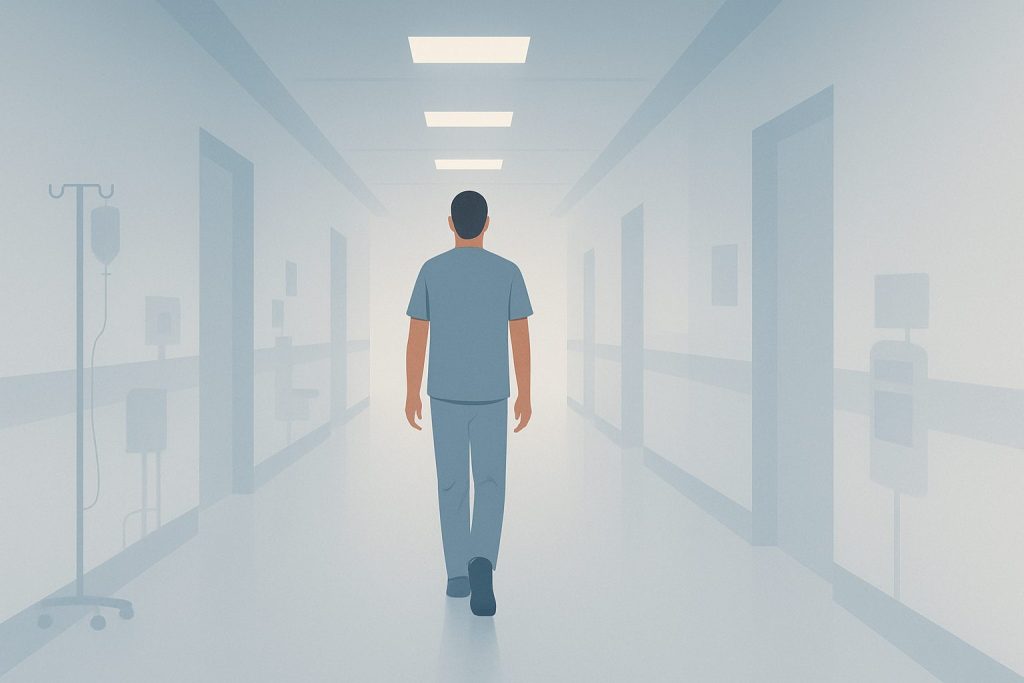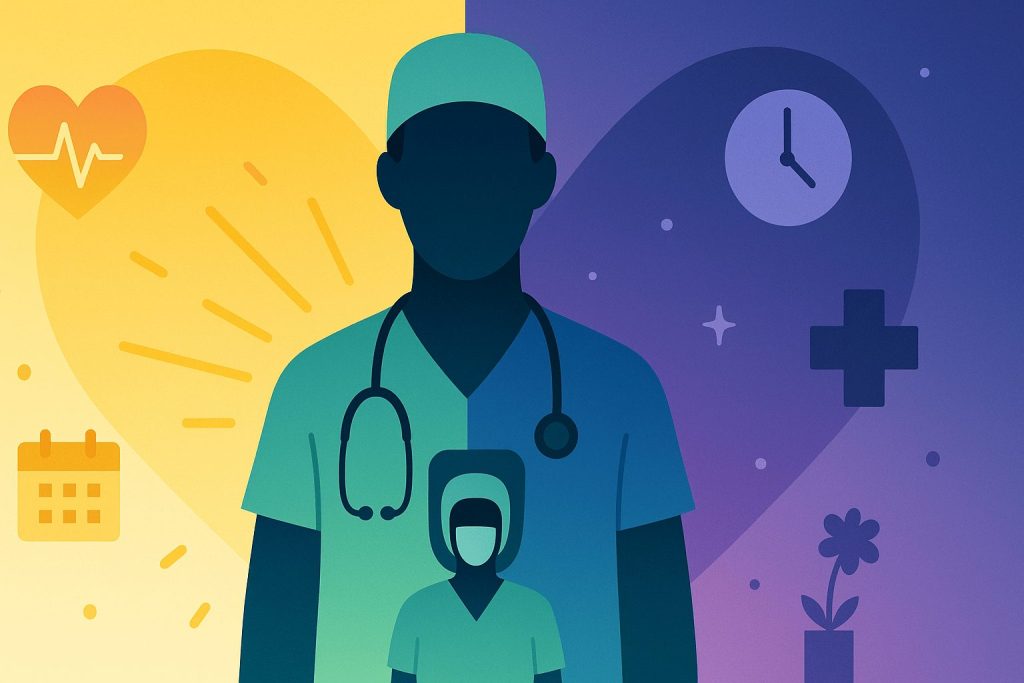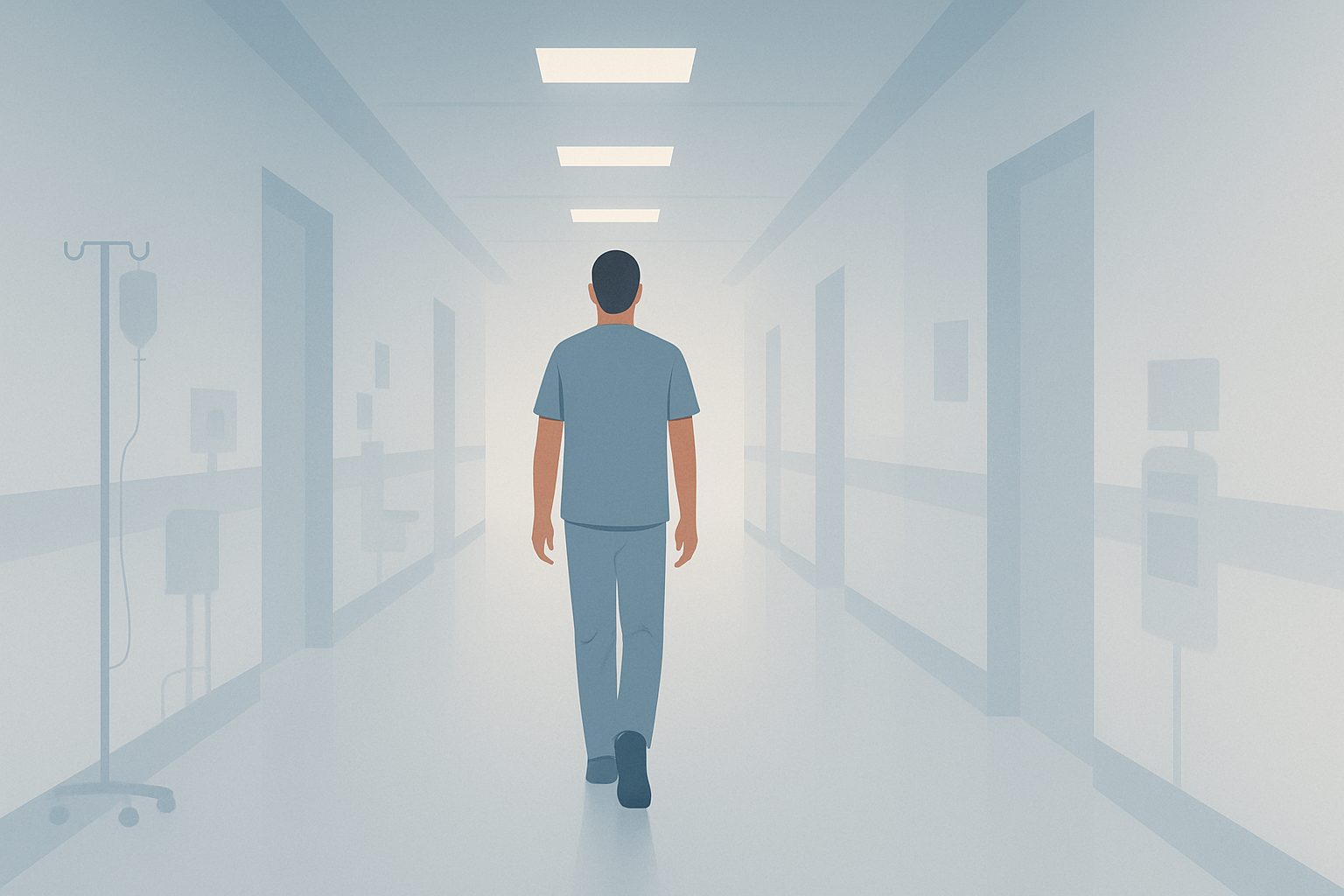Healthcare professionals face extraordinary challenges daily, but some days test the very core of their resilience and dedication. Recent accounts from hospitalists across the United States reveal the profound emotional and professional challenges that define their most difficult moments in medicine. These stories illuminate not just the struggles, but the remarkable humanity that drives healthcare professionals through their darkest hours.
The role of a hospitalist extends far beyond medical expertise. These physicians serve as guardians of life, bearers of devastating news, and sources of comfort during patients’ most vulnerable moments. Their experiences offer valuable insights into the emotional landscape of modern healthcare and the personal costs of saving lives.
Understanding these challenges becomes increasingly important as healthcare systems face mounting pressures. Staff shortages, increased patient loads, and evolving medical complexities create environments where even experienced professionals can feel overwhelmed. These stories provide crucial perspective on the human side of healthcare delivery.

The Pandemic’s Unprecedented Challenges
Dr. Ethan Molitch-Hou, now an assistant professor and director of the Hospital Medicine Sub-Internship at the University of Chicago, recalls one of his most challenging days during the early pandemic. After nine years as an attending physician, he thought he had experienced the full spectrum of hospital medicine’s emotional demands.
The case involved a severely ill COVID-19 patient whose condition had deteriorated beyond recovery. Hospital visitor restrictions meant family members couldn’t be present during their loved one’s final moments. Dr. Molitch-Hou found himself serving as an intermediary, facilitating phone conversations between patients and their families.
“I had been talking with the woman’s son every day,” Dr. Molitch-Hou recounted. “Unfortunately, it was Mother’s Day when she passed, and I had to hold the phone during their last conversation.” The emotional weight of this moment was compounded by his own recent loss—his mother had died just a year earlier.
This experience highlights how healthcare professionals often carry their own grief while supporting others through theirs. The pandemic created unique circumstances where healthcare documentation became even more critical, as providers needed to maintain detailed records while managing unprecedented emotional and logistical challenges.
The frequency of difficult outcomes during COVID-19 intensified the emotional burden on healthcare workers. “The pandemic was filled with one sad story after another as we struggled to figure out our best treatment plans,” Dr. Molitch-Hou explained. The combination of isolation, uncertainty, and repeated loss created a perfect storm of psychological stress.
Bearing Witness to Life’s Final Chapters
Dr. Nikhil Sood, a hospitalist at Banner Gateway Medical Center in Gilbert, Arizona, and assistant professor at the University of Arizona College of Medicine, shares a different but equally profound challenge. Working in a cancer hospital, he regularly cares for terminally ill patients and their families during their most desperate hours.
One particular case involved a young patient with metastatic cancer who had exhausted all treatment options. Dr. Sood entered the room to find the patient sitting in bed with tears streaming down his face, while his wife leaned against his shoulder, “with fear and sadness in her eyes, hoping for a miracle.”
The conversation that followed revealed the couple hadn’t eaten in over 24 hours—a simple need that had been overshadowed by their overwhelming grief and fear. When Dr. Sood offered to order food for them, the wife broke down completely. This moment crystallised the profound difference that basic human compassion can make in healthcare settings.
“As I walked away, I reflected on the difference I made by showing empathy, making them feel heard, connecting with them, and relating to their situation,” Dr. Sood recalled. The patient transitioned to comfort care and died within 24 hours, surrounded by family and in as much peace as possible.
This experience illustrates the dual role hospitalists often play—medical professionals and emotional supporters. The ability to maintain comprehensive patient records becomes crucial during these transitions, ensuring continuity of care while preserving dignity and comfort.

When Saving Lives Takes Its Own Toll
Christmas Eve brought an unexpected challenge for Dr. Andrea Braden, an OB/GYN hospitalist and lead clinical educator for TeamHealth in Atlanta. What began as a lighthearted conversation with one patient quickly transformed into a life-threatening emergency.
“From the moment I walked in the patient’s room, I knew something was very wrong,” Dr. Braden recalled. The patient’s uterus had ruptured, putting both mother and baby’s lives in immediate danger. Despite her 18 years of experience with obstetric emergencies, this case affected her differently.
Even after successfully saving both lives, Dr. Braden struggled with lasting effects. “I couldn’t sleep. I kept waking up with a startle every time I did fall asleep. And I couldn’t close my eyes without seeing replays of that delivery. I couldn’t stop crying.”
The emotional aftermath reveals an often-overlooked aspect of healthcare—the psychological impact of high-stakes decisions. While medical training prepares physicians for technical challenges, the emotional processing of life-and-death moments requires different kinds of support and coping mechanisms.
Dr. Braden also highlighted the personal sacrifices inherent in healthcare careers. “What continues to haunt me is the duality of feeling grateful that I was there that Christmas Eve morning to save a mom and baby’s lives and simultaneously resentful for—once again—giving up the opportunity to make precious memories with my own family.”
This tension between professional duty and personal life affects many healthcare workers. The irregular schedules, emergency calls, and holiday coverage requirements create ongoing challenges for maintaining work-life balance and family relationships.
The Terror of Flying Solo
Dr. Monique Nugent, a hospitalist at South Shore Hospital in Weymouth, Massachusetts, experienced her most challenging day during the transition from residency to independent practice. With 18 patients under her care and no supervisor for the first time, she faced the full weight of autonomous medical decision-making.
“I didn’t eat lunch, and I didn’t take a break,” Dr. Nugent recalled of her more than 12-hour day. “I was really on my own for the first time, and suddenly I lacked confidence. I was a confident and efficient resident and chief resident. Yet, that day, I was very aware that no one was checking on me.”
The psychological shift from supervised learning to independent practice created paralysing self-doubt. Dr. Nugent found herself second-guessing basic decisions and becoming inefficient despite her previous competence. The day stretched until nearly 11 PM, leaving her emotionally exhausted and questioning her career choice.
“I cried to my husband: There is no way I can do this job. I’m not going to be good at it if I can’t get through the first day,” she admitted. The experience nearly led her to consider not returning the following day.
However, the next day brought renewed confidence and perspective. “I got much better at what I do. I’m a totally different physician than I was 13 years ago. I was a scared new doctor, but I made it through, and that makes me proud.”
This story illustrates the importance of mentorship and gradual transition in medical training. It also highlights how efficient documentation systems can help new physicians manage their workload more effectively, reducing the cognitive burden during already stressful situations.
The Emotional Architecture of Hospital Medicine
These accounts reveal common themes in hospitalists’ most challenging experiences. The emotional weight of patient loss, the burden of being intermediaries between families and harsh realities, and the personal sacrifices required by the profession create a complex psychological landscape.
The isolation factor emerges repeatedly across these stories. Whether due to pandemic restrictions, the solitary nature of difficult decisions, or the emotional distance required to function professionally, hospitalists often find themselves bearing witness to profound human experiences without adequate emotional support.
The frequency of traumatic experiences in hospital medicine can lead to cumulative stress and burnout. Each difficult case adds to an emotional reservoir that may eventually overflow without proper processing and support mechanisms.

Coping Mechanisms and Resilience Building
Healthcare professionals develop various strategies for managing emotional challenges. Some find meaning in the impact they have on patients and families, even during difficult circumstances. Others focus on the technical aspects of care delivery and the satisfaction of problem-solving.
Professional support systems play crucial roles in maintaining resilience. Debriefing sessions, peer support groups, and formal counselling services help healthcare workers process traumatic experiences and develop healthy coping mechanisms.
The importance of work-life balance becomes evident in these stories. Healthcare professionals who maintain connections with family, hobbies, and interests outside medicine often demonstrate greater resilience in facing professional challenges.
Technology can also play a supportive role. Advanced documentation tools that reduce administrative burden allow healthcare professionals to focus more energy on patient care and emotional well-being rather than paperwork and record-keeping.
Systemic Factors Contributing to Difficult Days
Healthcare system pressures contribute significantly to the challenges hospitalists face. Staff shortages mean longer shifts and higher patient loads, reducing the time available for emotional processing and self-care.
Resource limitations affect both patient care quality and provider stress levels. When hospitalists cannot provide optimal care due to system constraints, they experience additional emotional burden beyond the inherent challenges of medical practice.
Communication systems within hospitals also impact hospitalist experiences. Clear protocols for family communication, efficient handoff procedures, and robust support networks can mitigate some of the emotional burden during difficult cases.
The COVID-19 pandemic highlighted many systemic weaknesses in healthcare delivery. Visitor restrictions, PPE shortages, and rapidly changing protocols created additional stressors for healthcare workers already managing complex patient care situations.
The Role of Technology in Supporting Healthcare Workers
Modern healthcare increasingly relies on technology to improve efficiency and outcomes. However, the human element remains irreplaceable in providing emotional support and making complex clinical decisions.
Documentation technology, in particular, can significantly impact healthcare worker well-being. Systems that streamline record-keeping and reduce administrative burden allow providers to spend more time on direct patient care and emotional support.
AI-powered tools are beginning to assist with routine tasks, potentially freeing healthcare professionals to focus on the uniquely human aspects of care that require empathy, intuition, and emotional intelligence.
The integration of technology must be carefully balanced to support rather than replace human connection in healthcare. While tools can improve efficiency, the fundamental relationships between healthcare providers, patients, and families remain central to healing.
Building Resilient Healthcare Systems
Healthcare organisations increasingly recognise the need to support provider well-being alongside patient care quality. Employee assistance programmes, mental health resources, and wellness initiatives help address the emotional challenges inherent in healthcare delivery.
Workload management strategies, including appropriate staffing levels and reasonable shift lengths, can prevent the overwhelming situations that contribute to provider burnout and emotional distress.
Training programmes that address emotional intelligence, stress management, and resilience building prepare healthcare workers for the psychological demands of their roles. These skills prove as important as clinical competencies in maintaining long-term career satisfaction.
Peer support networks within healthcare organisations provide crucial emotional outlets for processing difficult experiences. Formal and informal mechanisms for sharing challenging cases and emotional responses help normalise these experiences and reduce isolation.
The Importance of Self-Care in Healthcare
Healthcare professionals often struggle with prioritising their own well-being while caring for others. The stories shared by these hospitalists illustrate how neglecting self-care can compound the challenges of difficult cases.
Basic self-care practices, including adequate nutrition, sleep, and breaks during long shifts, form the foundation for emotional resilience. Healthcare systems must actively support these practices rather than inadvertently discouraging them through unrealistic expectations.
Mental health support for healthcare workers requires destigmatisation and accessibility. Providers need assurance that seeking help for emotional challenges will not negatively impact their careers or professional standing.
Regular reflection and processing of difficult experiences help prevent the accumulation of unresolved trauma. Whether through formal debriefing sessions or informal peer conversations, creating space for emotional processing proves essential for long-term well-being.
Learning from Difficult Experiences
The hospitalists who shared their stories demonstrate how challenging experiences can ultimately contribute to professional growth and enhanced empathy. Each difficult day provides opportunities for learning and developing greater resilience.
These experiences often deepen healthcare providers’ understanding of suffering and their capacity for compassion. The emotional challenges become part of their professional development, enhancing their ability to support future patients and colleagues.
Sharing difficult experiences helps normalise the emotional challenges of healthcare and reduces the isolation many providers feel. When healthcare professionals acknowledge their struggles openly, it creates permission for others to seek support and process their own challenges.
The stories also highlight the importance of perspective and time in processing traumatic experiences. What feels overwhelming in the moment may become a source of strength and wisdom over time, particularly with appropriate support and reflection.
Impact on Patient Care Quality
The emotional state of healthcare providers directly affects patient care quality. Providers who are overwhelmed, exhausted, or emotionally depleted may struggle to deliver optimal care or maintain therapeutic relationships with patients and families.
Conversely, providers who have developed healthy coping mechanisms and receive adequate support often demonstrate enhanced empathy and clinical decision-making abilities. Their emotional resilience translates into better patient experiences and outcomes.
Healthcare systems that prioritise provider well-being often see improvements in patient satisfaction, safety metrics, and overall care quality. The investment in supporting healthcare workers yields benefits throughout the organisation.
The relationship between provider well-being and patient care creates a compelling business case for healthcare organisations to invest in comprehensive support systems for their staff.
Future Directions in Healthcare Support
Healthcare organisations are exploring innovative approaches to supporting provider well-being. These include mindfulness programmes, resilience training, and peer support initiatives specifically designed for healthcare environments.
Technology continues to evolve in ways that can support healthcare worker well-being. From AI-powered documentation systems that reduce administrative burden to apps that support mental health and stress management, technological solutions complement human support systems.
Research into healthcare worker well-being is expanding, providing evidence-based approaches to supporting provider resilience and preventing burnout. This research informs policy development and resource allocation decisions within healthcare organisations.
The recognition of healthcare worker well-being as a patient safety issue has elevated its priority within healthcare systems. This perspective shift encourages more systematic and comprehensive approaches to supporting provider emotional health.
Key Takeaways
Human connection remains central to healthcare: Despite technological advances, the emotional and relational aspects of healthcare cannot be automated or replaced. Healthcare providers serve as crucial bridges between medical science and human compassion.
Emotional challenges are inherent in healthcare: The stories shared by these hospitalists illustrate that difficult days are not failures but inevitable aspects of healthcare delivery. Acknowledging this reality helps normalise the emotional challenges providers face.
Support systems are essential: Whether formal employee assistance programmes or informal peer networks, support systems play crucial roles in helping healthcare providers process difficult experiences and maintain resilience.
Self-care is not selfish: Healthcare providers must prioritise their own well-being to maintain their capacity for caring for others. This includes adequate rest, nutrition, emotional processing, and seeking help when needed.
Technology can support but not replace human elements: While advanced documentation tools and other technologies can reduce administrative burden and improve efficiency, they cannot replace the empathy, intuition, and emotional intelligence that define excellent healthcare.
Perspective and time aid healing: Many challenging experiences become sources of strength and wisdom over time, particularly with appropriate support and reflection. The initial trauma can transform into deeper compassion and professional growth.



